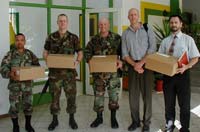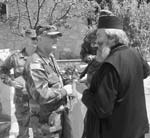| FOB
Briefs
Vol. 10, No. 1, December,
2003
Reflections
on Peacekeeping in Bosnia
By
Colonel Ronald Lee Cobb, US Army (Ret.)
 |
 |
| Colonel Ron Cobb (center), FOB’s
Chris Bragdon, Medresa School Imam Razim Colic, and two
SFOR soldiers with laptop computers donated to the school
by SFOR familes and friends. |
|
From January 2003 through October 31, 2003,
I served the NATO peacekeeping mission as a United States
Army Staff Officer in Eagle Base near Tuzla, Bosnia, under
the command of General Ron Mason of Stabilization Force (SFOR)
13.
Peacekeeping missions tend to be more complicated than combat.
Because of the multiethnic nature of central Bosnia, this
was graphically true for our mission. Not only were Croat,
Bosniac, Roma (Gypsy), and Serbian identities a part of the
puzzle, there were also Roman Catholic, Islamic, Orthodox
Christianity, agnostic, atheist, and postcommunist ideologies
involved. Tie this in with the Serbian Mafia, the Bosnian
Mafia, the slow growth of civil government, the lack of law
and civic standards from years of war, and a 50 percent unemployment
rate, and one can see how problems can logarithmically escalate.
As Command Chaplain (Colonel) of SFOR 13, one of my peacekeeping
duties was to interface with the religious leaders of northeastern
Bosnia. In Tuzla, FOB’s director of Bosnia projects,
Chris Bragdon, was helpful to me beyond words. He was instrumental
in guiding me to propose to Mufti Husein Karazovic four monthly
faith-based therapy classes for his imams (Islamic pastors)
and leaders so that they could learn methods of therapy that
have proven effective in the United States. Chris also suggested
a meeting with Father Benedict, abbott of a Serbian Orthodox
monastery east of Tuzla. I felt that Chris was such a key
part of my communication with these religious leaders that
I always invited him to attend these meetings. His sensitivity
to Bosnian culture and religion, and the support of FOB Director
Glenn Ruga, were a large part of the success of many missions
during SFOR 13.
Since the end of the war in 1995, drug addiction and alcoholism
have been escalating problems in Bosnia, as they have been
for much of eastern Europe and the countries of the former
Soviet Union. For years I worked as a nationally certified
addiction therapist with the well-known Menninger Psychiatric
Hospital, which has recently become part of the Medical Center
complex in Houston, Texas. With General Mason’s permission,
I brought the first Croatian-language (very similar to Bosnian)
Alcoholics Anonymous books into central Bosnia and distributed
them to Mufti Karazovic at Tuzla, the local imams, Bishop
Basil in Bijelijna, Orthodox priests and monks, Zepce eighth-grade
students, Zepce school staff, Imam Tutnjic in Zepce, and the
staff at the new rehabilitation center for drug-addicted teenagers
north of Lukovac.
After 29 years in the Reserve Components of the United States
Army, I retired on November 7, 2003. My plans for 2004 include
hosting the leading imam of Tuzla, Amir Karic, in my home
in the center of the United States this spring. I know Imam
Amir will identify with the Bosnian-like connection to the
earth, wheat, cattle, and corn that Kansas citizens understand.
Then in May and June 2004, my wife, Kathleen, and I will visit
Bosnia with many more AA “Big Books” to take to
each of the previous Bosnian groups and to encourage more
ethnic interaction and faith-based therapy work. We will then
serve as volunteers with Friends of Bosnia and stay with a
Bosnian family during our visit.
 |
 |
Colonel Cobb meeting with
Father Benedict in Papraca |
|
Memories of Bosnia: The 35th Division and
the SFOR 13 NATO Peace Keeping Mission, the book I have
nearly finished writing, has caused me to ponder many things
about Bosnia. Good things are happening there. Freedom and
free trade are slowly developing. Minefields are being cleared.
Shattered buildings are being repaired. What is most important,
however, is that through people like Chris Bragdon, Glenn
Ruga, and you as volunteers, and through the very hard work
of the Bosnian people, human lives are being mended in practical,
therapeutic ways and inner and outward peace are coming in
small but steady steps. Thank you for caring about your fellow
human beings who continue to need your help in Bosnia.
Ron Cobb is the author of a soon-to-be-published
book, Memories of Bosnia: The 35th Division and the SFOR
13 NATO Peace Keeping Mission, which
will be available through FOB’s on-line bookstore:
www.friendsof
bosnia.org/resource_books.html.
|

















